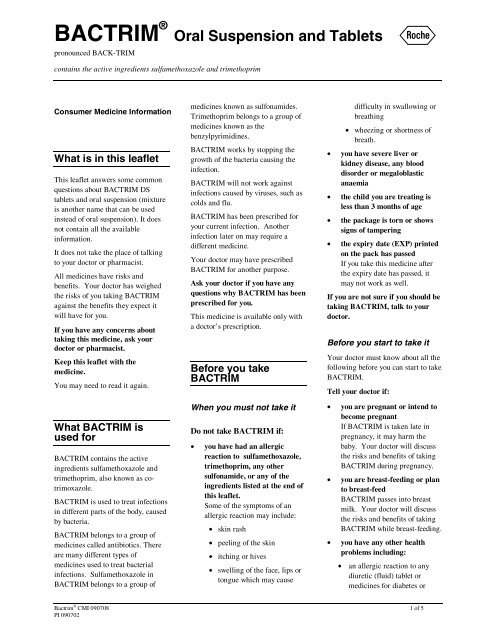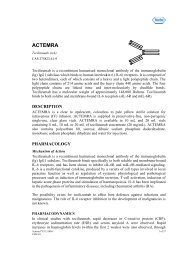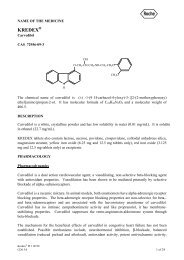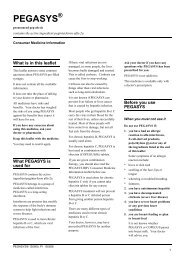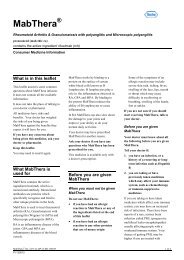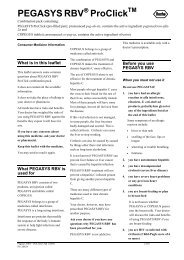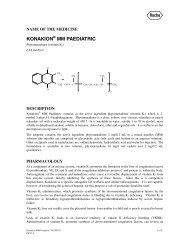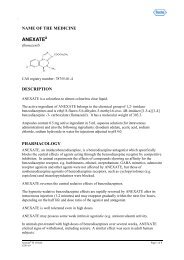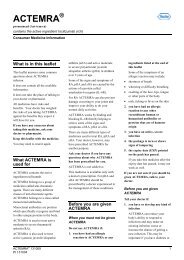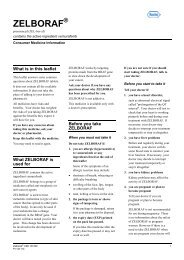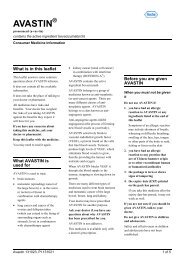Bactrim (sulfamethoxazole and trimethoprim ... - Roche Australia
Bactrim (sulfamethoxazole and trimethoprim ... - Roche Australia
Bactrim (sulfamethoxazole and trimethoprim ... - Roche Australia
Create successful ePaper yourself
Turn your PDF publications into a flip-book with our unique Google optimized e-Paper software.
BACTRIM ® Oral Suspension <strong>and</strong> Tablets<br />
pronounced BACK-TRIM<br />
R<br />
contains the active ingredients <strong>sulfamethoxazole</strong> <strong>and</strong> <strong>trimethoprim</strong><br />
Consumer Medicine Information<br />
What is in this leaflet<br />
This leaflet answers some common<br />
questions about BACTRIM DS<br />
tablets <strong>and</strong> oral suspension (mixture<br />
is another name that can be used<br />
instead of oral suspension). It does<br />
not contain all the available<br />
information.<br />
It does not take the place of talking<br />
to your doctor or pharmacist.<br />
All medicines have risks <strong>and</strong><br />
benefits. Your doctor has weighed<br />
the risks of you taking BACTRIM<br />
against the benefits they expect it<br />
will have for you.<br />
If you have any concerns about<br />
taking this medicine, ask your<br />
doctor or pharmacist.<br />
Keep this leaflet with the<br />
medicine.<br />
You may need to read it again.<br />
What BACTRIM is<br />
used for<br />
BACTRIM contains the active<br />
ingredients <strong>sulfamethoxazole</strong> <strong>and</strong><br />
<strong>trimethoprim</strong>, also known as cotrimoxazole.<br />
BACTRIM is used to treat infections<br />
in different parts of the body, caused<br />
by bacteria.<br />
BACTRIM belongs to a group of<br />
medicines called antibiotics. There<br />
are many different types of<br />
medicines used to treat bacterial<br />
infections. Sulfamethoxazole in<br />
BACTRIM belongs to a group of<br />
medicines known as sulfonamides.<br />
Trimethoprim belongs to a group of<br />
medicines known as the<br />
benzylpyrimidines.<br />
BACTRIM works by stopping the<br />
growth of the bacteria causing the<br />
infection.<br />
BACTRIM will not work against<br />
infections caused by viruses, such as<br />
colds <strong>and</strong> flu.<br />
BACTRIM has been prescribed for<br />
your current infection. Another<br />
infection later on may require a<br />
different medicine.<br />
Your doctor may have prescribed<br />
BACTRIM for another purpose.<br />
Ask your doctor if you have any<br />
questions why BACTRIM has been<br />
prescribed for you.<br />
This medicine is available only with<br />
a doctor’s prescription.<br />
Before you take<br />
BACTRIM<br />
When you must not take it<br />
Do not take BACTRIM if:<br />
• you have had an allergic<br />
reaction to <strong>sulfamethoxazole</strong>,<br />
<strong>trimethoprim</strong>, any other<br />
sulfonamide, or any of the<br />
ingredients listed at the end of<br />
this leaflet.<br />
Some of the symptoms of an<br />
allergic reaction may include:<br />
• skin rash<br />
• peeling of the skin<br />
• itching or hives<br />
• swelling of the face, lips or<br />
tongue which may cause<br />
difficulty in swallowing or<br />
breathing<br />
• wheezing or shortness of<br />
breath.<br />
• you have severe liver or<br />
kidney disease, any blood<br />
disorder or megaloblastic<br />
anaemia<br />
• the child you are treating is<br />
less than 3 months of age<br />
• the package is torn or shows<br />
signs of tampering<br />
• the expiry date (EXP) printed<br />
on the pack has passed<br />
If you take this medicine after<br />
the expiry date has passed, it<br />
may not work as well.<br />
If you are not sure if you should be<br />
taking BACTRIM, talk to your<br />
doctor.<br />
Before you start to take it<br />
Your doctor must know about all the<br />
following before you can start to take<br />
BACTRIM.<br />
Tell your doctor if:<br />
• you are pregnant or intend to<br />
become pregnant<br />
If BACTRIM is taken late in<br />
pregnancy, it may harm the<br />
baby. Your doctor will discuss<br />
the risks <strong>and</strong> benefits of taking<br />
BACTRIM during pregnancy.<br />
• you are breast-feeding or plan<br />
to breast-feed<br />
BACTRIM passes into breast<br />
milk. Your doctor will discuss<br />
the risks <strong>and</strong> benefits of taking<br />
BACTRIM while breast-feeding.<br />
• you have any other health<br />
problems including:<br />
• an allergic reaction to any<br />
diuretic (fluid) tablet or<br />
medicines for diabetes or<br />
<strong>Bactrim</strong> ® CMI 090708 1 of 5<br />
PI 090702
overactive thyroid. This may<br />
increase your chances of an<br />
allergic reaction to<br />
BACTRIM<br />
• any type of blood disorder<br />
(including porphyria <strong>and</strong><br />
glucose-6-phosphate<br />
dehydrogenase deficiency)<br />
• kidney or liver disease<br />
• a hereditary disorder called<br />
phenylketonuria<br />
• epilepsy (fits or convulsions)<br />
• asthma<br />
• allergic disorders<br />
• rheumatoid arthritis<br />
• urinary obstruction<br />
• folic acid deficiency<br />
• you are allergic to any other<br />
medicines, foods, dyes or<br />
preservatives<br />
Taking other medicines<br />
Tell your doctor if you are taking<br />
any other medicines including any<br />
that you have bought from a<br />
pharmacy, supermarket or<br />
healthfood shop.<br />
Some medicines may interfere with<br />
BACTRIM. These medicines<br />
include:<br />
• pyrimethamine, a medicine for<br />
malaria<br />
• sulphonylureas, medicines for<br />
diabetes eg tolbutamide<br />
• fluid tablets (diuretics)<br />
• phenytoin, a medicine for<br />
epilepsy<br />
• rifampicin, another kind of<br />
antibiotic<br />
• methotrexate, a medicine used in<br />
the treatment of arthritis <strong>and</strong><br />
cancer<br />
• cyclosporin, a medicine used to<br />
treat organ transplant patients<br />
• warfarin, a medicine used to thin<br />
the blood<br />
• digoxin, a medicine used to treat<br />
certain heart conditions<br />
• procainamide, a medicine used to<br />
treat certain heart conditions<br />
• amantidine, a medicine used to<br />
treat the influenza virus <strong>and</strong><br />
Parkinson’s Disease<br />
• oral contraceptives (“The Pill”)<br />
• indomethacin, a medicine used to<br />
treat arthritis <strong>and</strong> other<br />
conditions<br />
These medicines may be affected by<br />
BACTRIM or may affect how well it<br />
works. You may need to use different<br />
amounts of your medicine, or you<br />
may need to take different<br />
medicines. Your doctor will advise<br />
you.<br />
Your doctor or pharmacist has more<br />
information on medicines to be<br />
careful with or avoid while taking<br />
BACTRIM.<br />
If you have not told your doctor<br />
about any of the above, tell them<br />
before you start taking<br />
BACTRIM.<br />
Use in very young children<br />
BACTRIM should not be given to<br />
premature babies or children<br />
younger than 3 months of age.<br />
Use in People Over 65 Years<br />
People over 65 years are more at risk<br />
of severe side effects when taking<br />
BACTRIM. The risk is greater if<br />
you have kidney or liver disease or<br />
are taking some types of other<br />
medicines, such as diuretics.<br />
Use in People with HIV<br />
infection<br />
People with HIV infection have been<br />
reported to get more side effects<br />
while being treated with BACTRIM<br />
than people without HIV.<br />
How to take BACTRIM<br />
Follow all directions given to you<br />
by your doctor or pharmacist<br />
carefully.<br />
They may differ from the<br />
information contained in this leaflet.<br />
How much to take<br />
Take BACTRIM exactly as your<br />
doctor has prescribed.<br />
Your doctor will tell you how much<br />
BACTRIM to take each day.<br />
The dose <strong>and</strong> length of time you<br />
have to take BACTRIM will depend<br />
on the type of infection you have.<br />
For adults <strong>and</strong> children over 12<br />
years, the usual dose of BACTRIM<br />
DS is one tablet twice per day.<br />
For children under 12 years of age,<br />
the dose of BACTRIM oral<br />
suspension depends on the age <strong>and</strong><br />
weight of your child. Your doctor or<br />
pharmacist will tell you how much<br />
your child should be given.<br />
How to take it<br />
Swallow BACTRIM DS tablets<br />
whole (or halve them as necessary)<br />
with a glass of water.<br />
The correct amount of BACTRIM<br />
oral suspension should be<br />
measured, using a metric measure,<br />
before being given by mouth.<br />
When to take it<br />
Take BACTRIM DS tablets or<br />
oral suspension after a meal.<br />
How long to take BACTRIM<br />
Continue taking BACTRIM until<br />
your doctor tells you to stop.<br />
The full course of BACTRIM<br />
prescribed by your doctor should be<br />
taken, even if you feel better after a<br />
few days. This will help clear your<br />
infection completely.<br />
If your symptoms do not improve<br />
within a few days, or if they become<br />
worse, let your doctor know.<br />
If you forget to take<br />
BACTRIM<br />
<strong>Bactrim</strong> ® CMI 090708 2 of 5<br />
PI 090702
Do not take an extra dose. Wait<br />
until the next dose <strong>and</strong> take your<br />
normal dose then.<br />
Do not try to make up for the dose<br />
that you missed by taking more<br />
than one dose at a time.<br />
If you are not sure what to do, ask<br />
your doctor or pharmacist.<br />
In case of an overdose<br />
Immediately telephone your doctor<br />
or Poisons Information Centre<br />
(telephone 13 11 26) for advice or<br />
go to Accident <strong>and</strong> Emergency at<br />
your nearest hospital if you think<br />
that you or anyone else may have<br />
taken too much BACTRIM even, if<br />
there are no signs of discomfort or<br />
poisoning.<br />
You may need urgent medical<br />
attention.<br />
If you take too much BACTRIM, you<br />
may feel sick or vomit, feel dizzy,<br />
depressed or confused or have a<br />
headache. You may also feel drowsy<br />
or become unconscious.<br />
Keep telephone numbers for these<br />
places h<strong>and</strong>y.<br />
If you are not sure what to do,<br />
contact your doctor or pharmacist.<br />
While you are taking<br />
BACTRIM<br />
Things you must do<br />
Tell all doctors, dentists <strong>and</strong><br />
pharmacists who are treating you<br />
that you are taking BACTRIM.<br />
Tell your doctor if you become<br />
pregnant while taking BACTRIM.<br />
Tell your doctor if, for any reason,<br />
you have not taken your medicine<br />
exactly as prescribed.<br />
Otherwise, your doctor may think<br />
that it was not effective <strong>and</strong> change<br />
your treatment unnecessarily.<br />
Tell your doctor if you feel the<br />
tablets or mixture are not helping<br />
your condition.<br />
Drink plenty of fluids while you<br />
are taking BACTRIM.<br />
This will help to flush the medicine<br />
through your system.<br />
If you are taking BACTRIM for a<br />
long time, visit your doctor<br />
regularly so your progress can be<br />
checked.<br />
Your doctor may ask you to have<br />
regular tests to check your kidneys,<br />
liver or blood.<br />
Tell your doctor you are taking<br />
BACTRIM if you have to have any<br />
blood tests.<br />
BACTRIM may affect the results of<br />
some blood tests.<br />
Contact your doctor immediately if<br />
you get severe diarrhoea, even if it<br />
develops several weeks after<br />
stopping BACTRIM. DO NOT<br />
take any diarrhoea medicine<br />
without first checking with your<br />
doctor.<br />
Diarrhoea medicines may make your<br />
diarrhoea worse or make it last<br />
longer.<br />
Things you must not do<br />
Do not stop taking BACTRIM or<br />
change the dose without first<br />
checking with your doctor.<br />
Do not let yourself run out of<br />
medicine over the weekend or on<br />
holidays.<br />
Do not give BACTRIM to anyone<br />
else even if their symptoms seem<br />
similar to yours.<br />
Do not use BACTRIM to treat<br />
other complaints unless your<br />
doctor says to.<br />
Do not take any other medicines<br />
whether they require a<br />
prescription or not without first<br />
telling your doctor or consulting<br />
with a pharmacist.<br />
Things to be careful of<br />
Be careful driving or operating<br />
machinery until you know how<br />
BACTRIM affects you.<br />
Sometimes use of this medicine<br />
allows other bacteria <strong>and</strong> fungi<br />
which are not sensitive to<br />
BACTRIM to grow. If other<br />
infections such as thrush occur<br />
while you are taking BACTRIM,<br />
tell your doctor.<br />
If outdoors, wear protective<br />
clothing or use a 15+ sunscreen.<br />
Your skin may burn more easily<br />
while you are taking BACTRIM.<br />
Side Effects<br />
Tell your doctor or pharmacist as<br />
soon as possible if you do not feel<br />
well while you are taking<br />
BACTRIM.<br />
BACTRIM helps most people with<br />
susceptible infections but it may<br />
have unwanted side effects in a few<br />
people.<br />
All medicines can have side effects.<br />
Sometimes they are serious, most of<br />
the time they are not. You may need<br />
medical treatment if you get some of<br />
the side effects.<br />
Ask your doctor or pharmacist to<br />
answer any questions you may<br />
have.<br />
If side effects do occur, they may be:<br />
• nausea, with or without vomiting<br />
• diarrhoea or other abdominal<br />
(gut) or stomach discomfort<br />
These side effects are not usually<br />
serious or long lasting.<br />
Tell your doctor if you notice these<br />
side effects <strong>and</strong> they worry you:<br />
• oral thrush (white, furry sore<br />
tongue <strong>and</strong> mouth)<br />
• vaginal thrush (sore itchy vagina<br />
with vaginal discharge)<br />
Your doctor will need to treat the<br />
thrush infection separately.<br />
Tell your doctor immediately if<br />
you notice any of the following:<br />
• jaundice (yellowing of the skin)<br />
• severe or watery diarrhoea<br />
<strong>Bactrim</strong> ® CMI 090708 3 of 5<br />
PI 090702
• any type of skin rash, peeling of<br />
the skin, severe itching or hives<br />
• fever, sore throat, lumps in the<br />
neck<br />
• cough, shortness of breath<br />
• severe persistent headache<br />
• discolouration of urine<br />
• swelling of the face <strong>and</strong> throat<br />
These symptoms are usually rare but<br />
may be serious <strong>and</strong> need urgent<br />
medical attention.<br />
Very rarely, people have died from<br />
complications due to certain severe<br />
skin, liver or blood reactions.<br />
Elderly people, people with liver or<br />
kidney disease <strong>and</strong> people taking<br />
certain other medicines are more at<br />
risk of these severe reactions.<br />
Other rare side effects include:<br />
• other allergic reactions<br />
• pins <strong>and</strong> needles in the h<strong>and</strong>s<br />
<strong>and</strong> feet<br />
• loss of appetite, fits, headaches,<br />
depression, imagined sensations<br />
or nervousness<br />
• increased or decreased urine<br />
production<br />
• unsteadiness or dizziness<br />
• sleeplessness, weakness,<br />
tiredness, increased sensitivity<br />
to light <strong>and</strong> stomach pains.<br />
If you experience any of these<br />
effects contact your doctor as soon<br />
as possible.<br />
This is not a complete list of all<br />
possible side effects. Others may<br />
occur in some people <strong>and</strong> there may<br />
be some side effects not yet known.<br />
Tell your doctor if you notice<br />
anything else that is making you<br />
feel unwell, even if it is not on this<br />
list.<br />
Ask your doctor or pharmacist if<br />
you don’t underst<strong>and</strong> anything in<br />
this list.<br />
Do not be alarmed by this list of<br />
possible side effects. You may not<br />
experience any of them.<br />
After taking BACTRIM<br />
Storage<br />
Keep your BACTRIM DS tablets<br />
in the blister pack until it is time<br />
to take them.<br />
Keep the oral mixture in the bottle<br />
until it is time to take it.<br />
If you take the tablets out of the<br />
blister pack or the mixture out of the<br />
bottle before it is time to take them,<br />
they may not keep well.<br />
Keep BACTRIM in a cool dry<br />
place where the temperature stays<br />
below 30°C.<br />
Do not store it, or any other<br />
medicine, in a bathroom or near a<br />
sink.<br />
Do not leave it in the car or on<br />
window sills.<br />
Heat <strong>and</strong> dampness can destroy some<br />
medicines.<br />
Keep BACTRIM where young<br />
children cannot reach it.<br />
A locked cupboard at least one-<strong>and</strong>a-half<br />
metres above the ground is a<br />
good place to store medicines.<br />
Disposal<br />
If your doctor tells you to stop<br />
taking BACTRIM, or the tablets<br />
or oral suspension has passed its<br />
expiry date, ask your pharmacist<br />
what to do with any medicine that<br />
is left over.<br />
Product Description<br />
Availability<br />
BACTRIM is available as tablets<br />
(800 mg/ 160 mg) or as an oral<br />
suspension (mixture) 200 mg/ 40 mg<br />
per 5 mL).<br />
BACTRIM comes in the following<br />
pack sizes:<br />
• BACTRIM DS – 10 tablets per<br />
carton<br />
• BACTRIM oral suspension –<br />
100 mL per bottle<br />
What BACTRIM looks like<br />
BACTRIM DS tablets are white to<br />
almost white, oblong, with a<br />
breakline on one side <strong>and</strong> “ROCHE<br />
800 + 160” on the other side.<br />
The tablets have a breakline so that<br />
they can be broken in half if needed.<br />
BACTRIM oral suspension is light<br />
beige in colour with a banana<br />
flavour.<br />
Ingredients<br />
Active ingredient - the active<br />
ingredients in BACTRIM DS tablets<br />
<strong>and</strong> mixture are <strong>trimethoprim</strong> <strong>and</strong><br />
<strong>sulfamethoxazole</strong>.<br />
• each BACTRIM DS tablet<br />
contains 160 mg of <strong>trimethoprim</strong><br />
<strong>and</strong> 800 mg of <strong>sulfamethoxazole</strong>.<br />
• each 5 mL of BACTRIM oral<br />
suspension contains 40 mg of<br />
<strong>trimethoprim</strong> <strong>and</strong> 200 mg of<br />
<strong>sulfamethoxazole</strong>.<br />
Inactive ingredients<br />
BACTRIM DS tablets also contain:<br />
• povidone (1201)<br />
• docusate sodium (480)<br />
• sodium starch glycollate<br />
• magnesium stearate (470)<br />
BACTRIM DS tablets are gluten free<br />
<strong>and</strong> lactose free.<br />
BACTRIM oral suspension also<br />
contains:<br />
• Cellulose - Dispersible (460)<br />
• methyl hydroxybenzoate (218)<br />
• propyl hydroxybenzoate (216)<br />
• sorbitol solution (420)<br />
• polysorbate 80 (433)<br />
• banana flavour 85509 H<br />
<strong>Bactrim</strong> ® CMI 090708 4 of 5<br />
PI 090702
• vanilla flavour 73690-36<br />
• water<br />
BACTRIM oral suspension is gluten<br />
free <strong>and</strong> sugar free.<br />
Distributor<br />
BACTRIM is distributed by:<br />
<strong>Roche</strong> Products Pty Limited<br />
ABN 70 000 132 865<br />
4 - 10 Inman Road<br />
Dee Why NSW 2099<br />
AUSTRALIA<br />
Customer enquiries: 1800 233 950<br />
Please check with your pharmacist<br />
for the latest Consumer Medicine<br />
Information.<br />
<strong>Australia</strong>n Registration numbers:<br />
BACTRIM DS tablets:<br />
• AUST R 162563<br />
BACTRIM Oral suspension:<br />
• AUST R 119404<br />
This leaflet was prepared 8 July<br />
2009.<br />
<strong>Bactrim</strong> ® CMI 090708 5 of 5<br />
PI 090702


